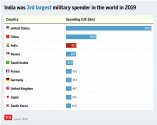A commentary on the recent speech by the Indian External Affairs Minister Subrahmanyam Jayshankar on India-China relationship. The author is Secretary General of China and South Asian Studies Center, Shanghai Institute of International Studies. This is a prominent Chinese think tank on South Asia. I found the author's comments are rather frank, even blunt. It helps us understand the Chinese views of India behaviors and challenges. The original commentary is in Chinese and the following is the Google Translate. The quality of the translation is decent, although it loses some of the edges.
Liu Zongyi: This speech by the Indian Foreign Minister is full of lies and self-righteousness
Secretary General of China and South Asian Studies Center, Shanghai Institute of International Studies
On January 28, Indian Minister of Foreign Affairs Jaishan Suh made a speech at the 13th All India Conference of China Studies in the form of a video, proposing the “three mutuals” and “eighths” to repair China-India relations. Principles".
A few days ago, because I was busy with other affairs, the author did not make public comments on Su Jaishan's speech. To be honest, I was a bit disdainful to comment at that time, because the main points of his speech have actually been said by the Indian side many times, and Chinese scholars have also criticized it constructively many times, but the Indian side has not yet reflected and improved.
Today’s comment is mainly to expose the lies and self-righteousness of the Indian side, so as to avoid the spread of falsehood and make people who do not understand the situation mistakenly believe that Jaishan Su’s speech is sincere.
First of all, Su Jiesheng believes that China and India are "in the process of building a modern nation-state, despite the differences in speed and intensity, both have risen in parallel in the contemporary era." What is "parallel"? Since the speed and intensity are different, how can it be called "parallel" rise? The use of this term either reflects the indifferent or arrogant ignorance of the Indian side, or the Indian side is deliberately misleading the world.
Before the 1990s, China and India had similar populations and similar per capita GDP, which can indeed be regarded as parallel development, but now China’s GDP is 6 times that of India. How can this be regarded as parallel development and parallel rise?
Regarding the improvement of India’s international status since the beginning of the 21st century, the United States and the West and we are all aware that India’s rapid economic development in the first decade of the 21st century is only part of the reason. The main reason is the rapid rise of China. The United States and the West need India to counterbalance China. Therefore, India's international status is deliberately elevated. So, if India is on the rise, at least half of the reason lies in China. India's "rise" is only a co-product of China's rise.
Secondly, as for what Su Jaishan said, "So far, we have not received even one defensible statement from China to explain its change of position on the issue of military stationing in the border area." This is purely nonsense.
In August 2019, India unilaterally abolished Article 370 of the Constitution concerning Kashmir, an internationally disputed territory, which not only violated Pakistan’s vital interests, but also included China’s Aksai Chin region into its newly established Ladakh Central Territory. Violated China's territorial sovereignty.
In September of that year, India not only provoked a confrontation with the Chinese army in the Pangong Lake area, but also held a large-scale military exercise nearby. In 2020, India took advantage of the outbreak of the new crown epidemic in China to build strategic roads along the actual control line in an attempt to encroach on Chinese territory in the Kalwan Valley and other places to ensure its road safety, which triggered conflicts.
India was the provoking party of the bloody conflict in Kalwan, and the Chinese casualties were the first, so they were forced to fight back. In addition, most of the more than 20 people killed in India were not killed by the Chinese, but fell into the valleys and rivers to drown and freeze to death. This is the result of unfavorable logistics. In this regard, the wicked Indians first filed a complaint, spread rumors internationally, accused China, and confused the public.
Recently, India awarded medals to 20 soldiers who died in the conflict in the Kalwan Valley on June 15, 2020, and awarded the culprit of the conflict in Kalwan, the former commander and colonel of the 16th Regiment in Bihar, India. The "great warrior" medal is issued, which shows that India has to go all the way to the dark on this issue.
As for the "three mutuals" claimed by Jaishan Su, "mutual respect, mutual understanding and common interest" are just high-sounding clichés. When negotiating with other countries, India will only ask other countries to respect and understand their interests and concerns, and never seriously consider the interests and concerns of other countries. This is a fact that even the United States and the West recognize. In the diplomatic negotiations between China and India, India has always made a series of demands to China, many of which are non-discretionary demands and involve third parties. If one of these requirements is not met, then India will therefore shelve the development of overall bilateral relations.
The so-called "Eight Principles" proposed by Jiesheng Su to repair China-India relations seem to be rigorous and reasonable on the surface, but in fact there are only two core issues:
One is to require China to respect the so-called "line of actual control", that is, the "line of actual control" advocated by India. This is what Su Jiesheng said, "When dealing with border issues, we must strictly observe and respect the actual control line." That is to say, only if China respects the "line of actual control" they advocate, can the border area achieve peace and tranquility, and then Sino-Indian relations can develop.
At present, the crux of the Sino-Indian border dispute is mainly that the two countries have different perceptions of the "line of actual control". If the "line of actual control" is determined, the boundary between the two countries will be basically determined, instead of "this line" as mentioned by Jaishan Su. The issue of the progress of border negotiations should be divided into two." The two are basically the same thing. Therefore, the essence of India’s proposition is that only when the border issue between the two countries is resolved can China-India relations develop, otherwise talks will be avoided.
The second core issue is to require China not to become a dominant country in Asia, to respect India's interests and concerns, and its sphere of influence, and to delineate its current sphere of influence in accordance with India's vision of its country's long-term status. This is what Jaishan Su said: "Multipolar Asia is an important part of a multipolar world." "Each country obviously has its own interests, concerns and priorities." "As a rising power, each country has its own not to be ignored. Vision and pursuit" and so on——
Since "multi-polar Asia is an important part of the multi-polar world", then China cannot be the only one in Asia, at least India should be on the same level as China. If China stands alone, then India must unite like-minded people to contain China. China should respect India’s interests, respect India’s dominant position in South Asia and the Indian Ocean, take care of India’s concerns, and cannot develop Sino-Pakistani relations or build a China-Pakistan Economic Corridor. Regarding the Kashmir issue, China must accept whatever India says; Southeast Asia should become In the common sphere of influence of China and India, India should enjoy the same status as China; in Central Asia, India should enjoy the same status as China and Russia. Although according to India's own vision, its national strength will not be able to approach China and the United States until 2050, China should now recognize that India enjoys the status of a major power on an equal footing with China and the United States, and should deal with India on the basis of this recognition.
------------------------------
To be continued ...







